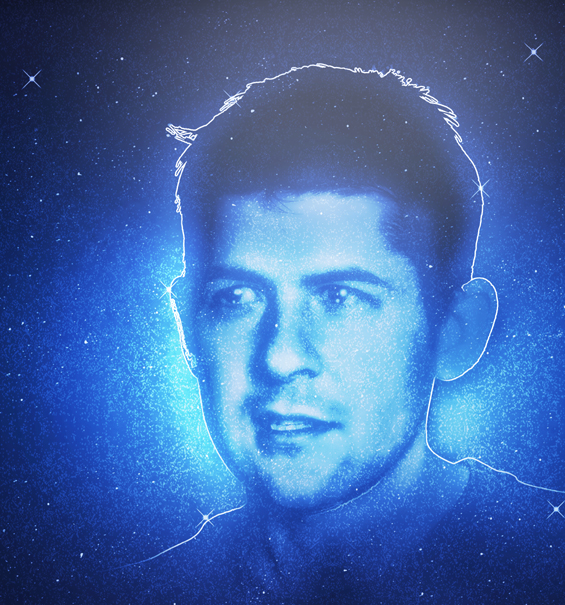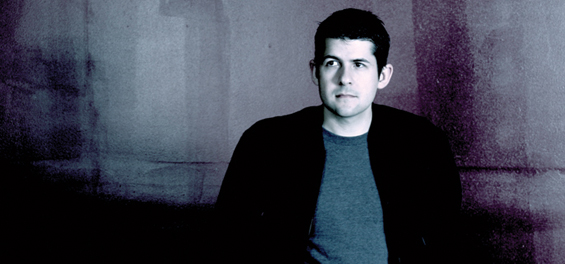

TEN QUESTIONS WITH OSBORNE
A man of multiple talents and guises, Todd Osborn (not a typo: the Ann Arbor resident adds the vowel to his Spectral Sound solo alias) has been a long-time contributor to multiple scenes: as proprietor for the Dubplate Pressure record store, as manager of ragga-jungle imprint Rewind!, as recording artist Soundmurderer (for Richard D. James' Rephlex label) and as partner to Tadd Mullinix in TNT. Word has it Osborn also writes his own software, speaks Japanese, and, in all likelihood, leaps tall buildings in a single bound. His Osborne persona moves to the forefront with the release of a splendid, eponymously-titled collection that features no shortage of deep house jubilance and classics cuts from yesterday and today (the album's original title was apparently Multitasking, in reference to the panoply of styles on display). We're delighted that Osborn agreed to elaborate on his working methods and discuss selected tracks from the new release.
1. Prior to hearing Osborne, I'd expected maybe something like a full-throttle techno collection and so was rather taken aback when those ultra-melodic Rhodes melodies appeared at the start of "16th Stage." Did you purposefully open the album with this piece as a way of declaring immediately that Osborne would challenge any pre-conceptions the listener might bring to it?
No, not at all. Sam (the owner of Ghostly) gets the credit for picking the tracks out and the order they're in. When I make music I'll make something like a house track, then a jungle track, then a heavy metal track, then a hip-hop beat, etc, etc. It's up to others to put it in perspective and relate the tracks to one another because I'm unable to do that.
2. "16th Stage" is one of the most beautiful pieces of music I've heard in a while. How did the song's ravishing theme come into being? Were you just improvising and it slowly came into focus? I love also how tastefully arranged the track is and how incrementally it builds towards rapture, with one layer after another added ever so gradually. Can you tell us about how exactly the arrangement came together?
Well, thanks a lot for that! That's very kind. Pretty much any track I make starts out with just a tone that I think sounds nice. I'll then multiply it and change the pitch of each to make chords out of it. Once I have a sequence of chords that I'm fairly happy with I'll start building the rest of the track around it. Nothing is pre-planned. The only things that would be close to being pre-conceived are some of the jungle tracks I do. In that case, I'll first hear bit of things I like and think "That would be good to build a track around." But for Osborne material, it usually just starts with a generated tone.
3. "Downtown" sparkles too. What I find fascinating about it is that it directly references all the genre signatures of house music yet still manages to sound like a totally fresh re-invention of it (and furthermore truly does exude a night-time downtown vibe). Is that an accurate interpretation of your own conception of the track or is totally off the mark?
I think back when I made "Downtown" (long, long ago) I was going for a UR/Interstellar Jazz vibe but at a slower tempo. It did end up having a Detroit progression (to me, at least) but I didn't want to name it "Detroit whatever" so "Downtown" was the best I could up with. I hate naming tracks, I would much rather just use the random file name I assign them. I don't know why I don't...
4. We're told that you wrote your own music software for the album and did so on a hand-built computer. Can you elaborate a bit on that? And why would you choose to do so when there's existing software and hardware available to use?
I didn't write it but I decomplied this software from 1996 quite a few times just to make minor changes in it. This is all in Turbo Pascal; I don't know a thing about newer programming languages. I like this old program primarily because I know my way around it so well. My view is that it makes no difference what software or hardware you use. No matter what it is, if you learn that thing inside and out you'll do fine.
5. One of the most refreshing things about the album is its uplifting spirit, something heard on tracks like "Evenmore" and "Suffer." Did you purposefully set out to emphasize this warm and emotive dimension or did that just develop naturally?
No, nothing is on purpose. Whenever you hear a change in a track it's because it just seemed like the logical place for me to take it to at the time. Many of the tracks I make have tons of alternate versions because there are so many options on where it can go and since I normally don't use "loops" I can change the sounds however I please.

6. "Ruling" pushes that positive feel even further with its euphoric deep house vibe. Would that you be singing? How much of the album's material is sample-derived as opposed to purely created by you?
"Ruling" is one of the only tracks with a sample, but it's taken from like a 20th-generation live reggae soundclash cassette so it's so obscure... and even if you heard the original outright I doubt it sounds much like what you hear in the track. But yeah, that's just the bit of vocal, everything else is generated sine-waves or tones from hardware (like most tracks of mine).
7. The acidy, drum machine-driven ferocity of "L8" sounds kin to Tadd Mullinix's James T Cotton style. Does the other's influence naturally seep in when you work together as you do and are closely associated?
Well, I'd say it sounds like TNT to me. I'm sure you know the Cotton stuff because there's so much of it out there. I have a ton of acid tracks (not released) that are really melodic, as opposed to Tadd's more beat-driven style. If you put both of these together you hear the TNT side of things. There are a few TNT releases as remixes and on our TNT label and I think this comes across in all of them. I guess what I mean is that none of the TNT tracks sound to me like anything either of us would do solely on our own.
8. You capture the authentic communal spirit of African music in "Afrika"while at the same time subtly integrate a Western funk feel too. Did you immerse yourself in the music of artists such as King Sunny Ade and Ebenezer Obey before producing the song? Where did the vocals come from?
Now that's a track with a proper sample. I had an old record with that track on there and pretty much just put a beat and bass line behind it and did a lot of editing; it's probably bordering on remix territory (and yes, the sample was cleared). I made that maybe around '01 or '02 just to play out but I had forgotten about it. Later I found it on my hard drive and played it out a few times and that's probably when Sam heard it and decided to release it. I like a lot of African chant and drum music.. lots of Ethiopian tunes, but I wouldn't say I specifically immersed myself in it at the time I made that.
9. One of the other things I like about Osborne is that the material seems free of irony and instead feels rooted in a genuine affection for genres like house and even IDM (e.g., the jubilant "Detune"). Or am I just deaf to the irony that is there?
There's no irony. It's pretty much like I mentioned before, the tracks just become what they are because it seems like the natural way for them to go in my mind.
10. Given that some of the material (e.g., "Afrika") dates back to 2004, should Osborne be regarded as a kind of "summing up"—a way of clearing the decks, so to speak, before moving on to the next stage? What else will we be hearing from you in the months ahead?
There's definitely lots more to come. Nowadays it seems every track I make is a tiny bit better than the last but they're still not at the level I know they will someday be at. Keep listening.
May 2008![]()